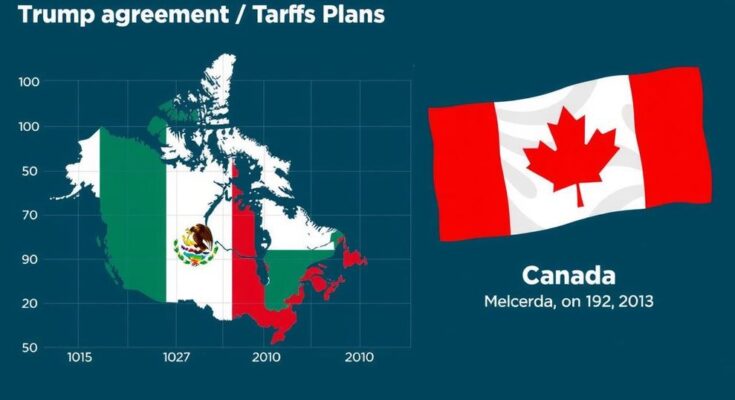President-elect Donald Trump’s proposed tariffs on imports from Mexico, Canada, and China could raise consumer prices and threaten the USMCA, the trade agreement he championed in 2020. Experts suggest these tariffs could exacerbate inflation, while Canada and Mexico’s leaders express concern over possible trade war implications. Trump’s approach could undermine cooperation with these key trading partners, ultimately harming the U.S. economy.
President-elect Donald Trump’s proposal to impose tariffs on imports from Canada, Mexico, and China poses significant risks to the U.S. economy, potentially leading to increased prices for consumer goods and jeopardizing the existing United States-Mexico-Canada Agreement (USMCA). Trump’s threat of a 25% tariff on products from Mexico and Canada, along with a 10% tariff on Chinese imports, is alarming, given that these countries are America’s primary trading partners. Experts warn that such measures may ultimately prove counterproductive, leading to higher costs for consumers and potentially diminishing the U.S.’s standing in global trade relations.
The foundation for Trump’s proposed tariffs stems from his dissatisfaction with immigration and drug trafficking, which he believes stems from these nations. While previous tariff threats during his first administration may have been seen as negotiating tactics, experts suggest that the current climate may not yield the same results, as countries are already aware of his approach. According to Raymond Robertson, a professor at Texas A&M University, “This is more likely a play designed to put pressure on our closest trading partners… If you’re on the football field and you call the same play twice, it’s not going to be as effective the second time.”
Economic analysts highlight that such tariffs drive inflation by elevating input costs for businesses, which are inevitably passed on to consumers. The Peterson Institute for International Economics estimates the average American household could incur additional costs exceeding $2,600 annually if these tariffs are realized. This proposal also comes in light of Trump’s pledge to renegotiate the USMCA, an update to the previous NAFTA agreement, which he implemented with significant political fanfare in 2020.
Canadian Prime Minister Justin Trudeau and Mexico’s President Claudia Sheinbaum have both expressed concern over Trump’s threats. Trudeau stated that he and Trump had a constructive conversation about their countries’ strong ties, while Sheinbaum warned against the dangers of initiating a trade war, stating, “These great challenges require cooperation and mutual understanding.”
In conclusion, while Trump’s tariff threats could be intended as negotiating tools, they likely carry the risk of escalating tensions and raising consumer prices within the U.S. The potential disruption of the USMCA could also further complicate trade relations with Canada and Mexico, potentially leading to reciprocal actions from these nations. As the economic significance of these countries persists, maintaining amicable trade relationships may be imperative for the American economy’s stability and growth.
In analyzing the implications of President-elect Donald Trump’s proposed tariffs, it is crucial to consider the historical context and recent developments in U.S. trade policy. The USMCA, signed during Trump’s administration in early 2020, represented a significant alteration to the pre-existing NAFTA framework, aimed at ensuring better trade conditions between the U.S., Canada, and Mexico. Trump’s recent tariff threats, articulated as a means to combat illegal immigration and drug trafficking, stand in stark opposition to the cooperative spirit of the USMCA, potentially undermining the agreements and negotiations that took years to finalize. Understanding the economic repercussions of tariffs, particularly regarding inflationary effects and international relations, is essential for assessing the potential outcomes of Trump’s proposed trade policies.
Ultimately, Donald Trump’s tariff strategy, if implemented, might not yield the desired outcomes and could precipitate increased prices for U.S. consumers. The repercussions of this approach may extend beyond immediate economic effects by damaging already established trade relations with Canada and Mexico, two of the United States’ most critical trading partners. A recalibration of negotiation strategies may be necessary to avoid an unnecessary trade conflict, particularly given the considerable investments made to establish the USMCA.
Original Source: abcnews.go.com




